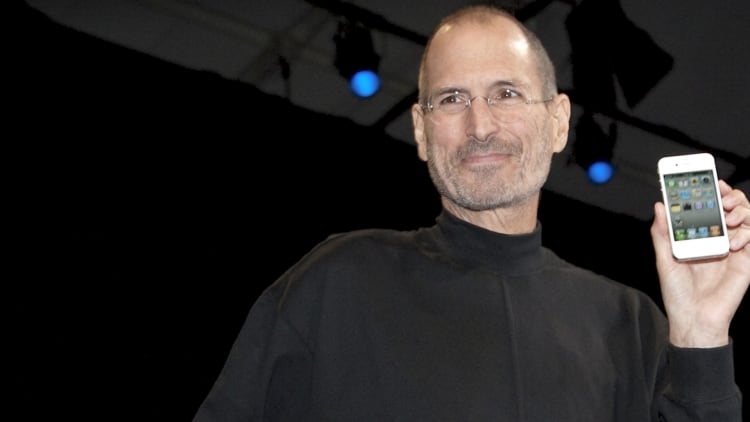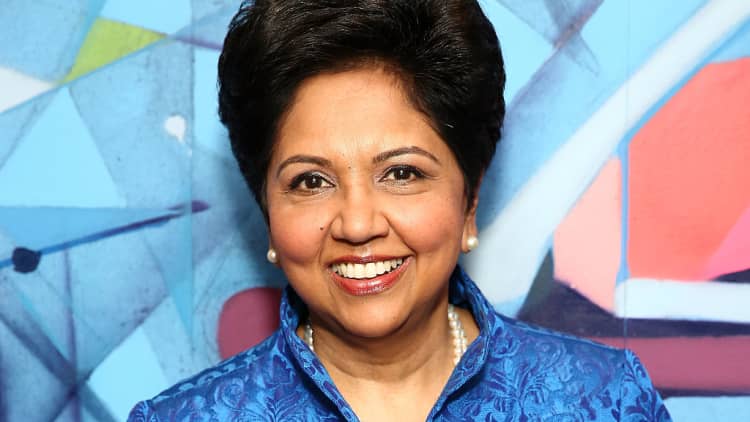Apple hit a market cap of $1 trillion on Thursday, becoming the first publicly traded U.S. company to reach the historic record.
"Steve founded Apple on the belief that the power of human creativity can solve even the biggest challenges — and that the people who are crazy enough to think they can change the world are the ones who do," Apple CEO Tim Cook said in an email to employees on Thursday. "Just as Steve always did in moments like this, we should all look forward to Apple's bright future and the great work we'll do together."
More than 40 years after Jobs co-founded Apple, the late tech visionary continues to be revered for his successful years of leading the company and the 2007 introduction of the iPhone, one of the company's most successful products.
But Jobs wasn't always so confident the world-changing item would be a wise investment for the company. In "The One Device: The Secret History of the iPhone," Motherboard senior editor Brian Merchant detailed how the smartphone came into existence and how even one of the most intelligent, powerful executives needed smart people to help him land at the right decision.
"Jobs was a powerful source of inspiration, a fierce curator of good ideas and rejector of bad ones, and a savvy and potent negotiator," Merchant told CNBC Make It last year, in an interview timed for the iPhone's 10th anniversary. "But the iPhone began as an experimental project undertaken without his knowledge, became an official project at the prodding of his executive staff and was engineered into being by a team of brilliant, unfathomably hard-working programmers and hardware experts."
Jobs had faith in a wide variety of talent, "from new blood to veteran hands," Merchant says. He notes that Jobs gave Scott Forstall — who would go on to create the iPhone operating system (iOS) — the ability to recruit anyone from the existing Apple staff for the new phone project.

Merchant said that Jobs was publicly resistant to the idea of Apple making a phone because he, like many other Apple engineers and executives, thought cell phones "sucked."
"'The problem with a phone,' Steve Jobs said in 2005, 'is that we're not very good going through orifices to get to the end users.' By orifices, he meant carriers like Verizon and AT&T, which had final say over which phones could access their networks," Merchant wrote in his book.
Merchant added that his interviews reveal that Jobs also wasn't initially convinced that the emerging smartphone category was going to be a wide market — he reportedly wondered if they'd be permanently relegated to the "pocket protector" crowd.
"Which, again, was a fair assessment; early smartphones were either indeed kind of geeky-looking or aimed at the email-obsessed business crowd," Merchant said.
Ultimately, Jobs trusted his team with the technical aspects of the experimental project, but "needed to see an interface that might be intuitive and exciting to lay-users before he'd be sold on the idea that Apple should get into the phone market," Merchant said.

Merchant reported that the iPhone's revolutionary multi-touch display was "born out of experimentation deep in the bowels of Apple, hidden in the beginning even from Jobs" and they only showed him a demo once they felt it was good enough.
A senior iPhone engineer, Andy Grignon, is quoted in Merchant's book saying, "The exec team was trying to convince Steve that building a phone was a great idea for Apple. He didn't really see the path to success."
Then Apple vice president Michael Bell reportedly sent Jobs a late-night email on Nov. 7, 2004, explaining why the company really should make the phone. Jobs called Bell immediately, and they argued for hours until Jobs finally relented, Merchant writes. When it became obvious that smartphones would become competitors to the iPod, Jobs changed his mind.
"Okay, I think we should go do it," Jobs said.
Grignon would later become the first person to receive a call from an iPhone.
For Jobs, "the issue was never with faith in his staff," Merchant said. "It was with whether entering the market at all was worth the risk."
Like this story? Like CNBC Make It on Facebook.
See more:


